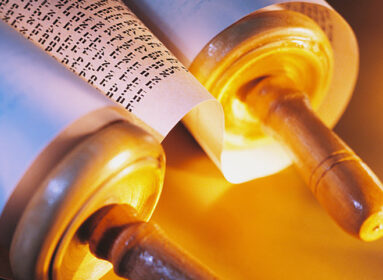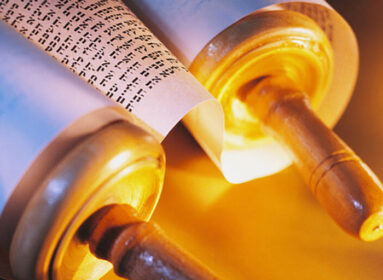By Shlomo Riskin ~
“These are the generations of Isaac the son of Abraham; Abraham gave birth to Isaac” (Genesis 25:19)
If Isaac is the son of Abraham, isn’t it obvious that Abraham parented Isaac? What is the significance of the apparent redundancy?
Is it possible that Abraham could be a biological parent to a son who is not part of his generations? Alternatively, is it possible for one to be part of the “generations” without being a biological child with parental DNA, as in the case of adoption or conversion, for example?
Moreover, Abraham’s name has been changed by God from “exalted father” (Av-ram) to “father of a multitude of nations” (Avraham – Av Hamon Goyim). Are Ishmael, the biological son of Abraham, and Esau, the biological grandson of Abraham (Isaac’s biological son) legitimate children of Abraham and part of the Abrahamic covenantal people? Evangelical Christians certainly see themselves as having been grafted onto the Abrahamic covenant. If so, what, if at all, is the unique status of Israel in the family of Abraham?
Almost from the very beginnings of the narrative of Abraham, the biblical text makes a clear-cut and far reaching distinction between ben (son, child) and zera (seed). The Hebrew “ben” is derived from the verb “bnh, which means “to build” since one’s biological child provides an additional storey to the household of the parent, sharing the same parental foundation stones or DNA. A child who contains the same genetic background as his or her parent has literally emerged from the original parental roots.
“Seed,” however, refers to the future; beyond biological considerations, it sets the stage for the parents to reproduce their personality, beliefs and ideology into the next generation. Buildings are focused upon earlier foundations, whereas seed promises renewed reproduction.
The Abrahamic covenant is established with God after Abraham’s victory over the four terrorist kings of the fertile crescent, and His promises that He will remain Abraham’s shield and that his reward will be exceedingly great. Abraham remonstrates: “Lord God, what can You possibly give me, since I walk about childless… behold, You have not given me seed (zera)” and God responds, “…someone who comes out from your loins, he will inherit you… count the stars… so shall be your seed” (Genesis 15:1-5). And then, when God additionally promises Abraham’s seed a homeland, the Bible concludes the chapter: “On that day, the Lord established a covenant with Abram saying, “To your seed I shall give this land…” (15:18). And so Abraham is promised seed and a homeland – the stuff that nations are made of.
But Abram is still lacking a biological heir. Hence, in the very next chapter (16), Sarai brings her servant, Hagar, to him so that she Sarah, may be built up from her in the manner of ancient adoption; “And so Hagar has a son to Abram,” a biological son through whom he will be “built”; adding another storey, a “ben” but not yet “seed” (zera).
In the following chapter, Abram becomes Abraham, a father of a multitude of nations. God then adds that He will fulfill His covenant with Abraham and his seed, and that this will be expressed through the ritual of circumcision. The son born to Sarah will be their covenantal seed (17:19-21), rather than Ishmael, who will be only a biological heir. When, later on in the narrative, Ishmael taunts and derides Isaac, God instructs the patriarch to banish Ishmael “since (only) through Isaac shall your seed (zera) be called (Gen. 21:10).
Hence, Abraham is to be a father of a multitude of nations; any people who live lives of compassionate righteousness and moral justice (abiding by at least the seven Noahide laws of morality), who believe in the one God and who spread His name and His desire for universal redemption throughout the world are to be considered children (banim) of Abraham, and may be our partners in redeeming the world. This is not dependent on acceptance of the Mosaic Code.
Only Isaac, however, is considered Abraham’s seed, and only Isaac is part of the Abrahamic covenant, which includes the commandment of circumcision marking the eternal relationship between God and His special nation; it is only descendants of Isaac who will enter the second covenant at Sinai and be responsible for keeping the 613 commandments of the Torah.
A ben or biological child has the same DNA as the parent, and so Ishmael has Abrahamic identity. But zera goes one step further; Isaac has covenantal continuity.
A biological son who marries outside the Jewish faith retains his biological identity with his forebears, but sacrifices his covenantal continuity (since his children aren’t Jewish). Conversely, a convert who is not biologically part of the family, through his or her acceptance of the Abrahamic and Mosaic teachings becomes a metaphysical child of Abraham (zera), expressing covenantal continuity even without the biological DNA.
Similarly, our sages taught that “whoever teaches a person Torah is considered as if they had borne him.”
This is what the opening verse of our biblical portion is teaching: “These are the generations of Isaac, the son of Abraham” – Isaac will retain the covenantal continuity; “Abraham gave birth to Isaac” – Isaac also shares his biological identity.
Rabbi Shlomo Riskin is chancellor of Ohr Torah Stone and chief rabbi of Efrat, Israel.








 Southern New England Jewish Ledger
Southern New England Jewish Ledger










